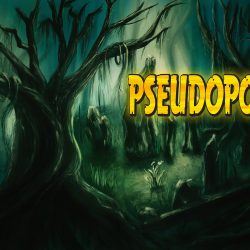The Orchard of Hanging Trees
by Nicole Cushing
It’s another cool April morning in Hell, and the hanging trees (just saplings, really) are starting to sprout fleshy, strangled buds that look like choking fetuses caught up in tiny, umbilical nooses.
Their embryonic faces haven’t yet developed features, but I know as the days get longer their lips will grow into a grimace; their eyes will ooze agony. I have already been warned that their first cries (when they can utter them) will be those of breathless suffering. Their first words, pleas for help. The curses will follow shortly thereafter.
But right now, as fetus-flowers, they only emit shrill, staccato mews. But even this meager vocalization makes me shudder. I lower my glance from the entire orchard, feeling disgust for the day ahead. I whistle a tune to distract myself from the noise of thousands of semi-sentients who exist in a state of more-or-less continuous suffocation; those to whom full-sentience will bring only misery.
I am not, after all, a monster – even if I am in the employ of Hell. Even if (as my fellow laborers predict) some of the fruit will grow up to call me “Demon”, this is an absurd epithet. I do not want to be in this position. But my cares, my wants, my sense of being an individual with free will – these are things of the past. Shams more easily harbored during a lifetime marinated in the sweet sauce of ignorance.



